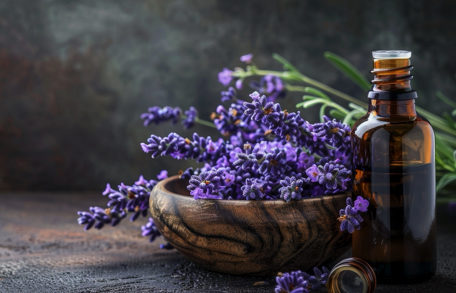HYSSOP: What research reveals about the health benefits of this ancient holy plant
Hyssop (Hyssopus officinalis), with its bright purple flowers and refreshing aroma, has been used for thousands of years as a medicinal and spiritual plant. Nowadays, scientific studies affirm that hyssop has unique health benefits, thanks to its powerful bioactive compounds.

Has anticancer properties
A 2014 review in Phytochemistry Reviews has discovered that hyssop contains a variety of bioactive compounds that could play a role in preventing or even targeting cancer cells.
The plant holds a unique mix of compounds like rosmarinic acid, a type of phenolic compound known for its strong antioxidant properties, which help neutralize harmful molecules that can lead to cell damage and potentially cause cancer.
Flavones like acacetin and tilianin have also been studied for their ability to limit cancer cell growth and induce apoptosis – a form of programmed cell death that keeps cells from becoming harmful.
Terpenoids in hyssop, such as oleanolic acid and ursolic acid, have been noted for their possible role in blocking cancer cell activity by interfering with key growth pathways. Some compounds, like agastaquinone, show cytotoxic effects against cancer cells – meaning they may actively work to weaken or destroy these cells.
Boosts immune system
Hyssop may offer some support for immune health, especially when it comes to fighting off viral infections, like herpes simplex (HSV) types 1 and 2. These viruses are widespread and can cause recurrent cold sores or genital sores and research suggests that hyssop could help in slowing their spread.
A 2016 review published in the Avicenna Journal of Phytomedicine examined the effects of Iranian medicinal plants, including hyssop, on HSV. The review highlighted that hyssop extract was able to delay HSV-1 infection in mice by more than 50 percent – indicating strong antiviral activity. The study found that a specific methanolic extract from hyssop leaves was effective not only against common strains but also against drug-resistant HSV strains in lab studies.
The mechanism appears to involve hyssop’s ability to significantly reduce plaque formation in infected cells while remaining gentle on healthy cells. In animal studies, hyssop extract extended survival time for infected mice by over 50 percent and reduced the mortality rate by 90 percent – compared to untreated cases.
While these findings are promising, experts stress that more research, especially human trials, is needed to fully understand hyssop’s effects on viruses like HSV.
Calms anxiety and reduces stress
Hyssop’s aromatic compounds may have a calming effect on the nervous system, making it a popular choice in aromatherapy. Pinocamphone and other terpenes in hyssop essential oil can interact with the body’s limbic system – the part of the brain that manages emotions – promoting relaxation and reducing stress. For those seeking a natural way to manage anxiety, hyssop may offer some benefits when used as part of an aromatherapy routine.
Eases joint pain and reduces inflammation
Hyssop contains anti-inflammatory compounds that may help reduce inflammation in the joints and muscles. Animal studies suggest that hyssop’s anti-inflammatory effects may stem from its ability to inhibit enzymes that trigger inflammation, such as cyclooxygenase.
Some users apply diluted hyssop oil directly to sore areas for relief, and research supports its effectiveness in reducing pain. This traditional method of topical application aligns with hyssop’s known medicinal properties, making it a valuable addition to natural joint care routines.
Supports digestive health
Hyssop contains essential oils like isopinocamphone and pinocamphone, which appear to support healthy digestion by promoting better movement and function within the gastrointestinal tract. This effect may ease symptoms of bloating, gas or indigestion.
A standout bitter diterpenoid in hyssop, known as marrubiin, has been shown to have antispasmodic properties – meaning, it relaxes the muscles of the digestive tract, reducing cramps and encouraging smoother digestion.
A study published in the Journal of Enzyme Inhibition and Medicinal Chemistry found that hyssop’s rich supply of flavonoids and tannins could help inhibit enzymes, such as alpha-chymotrypsin and urease, which are linked to gastric and peptic ulcers. Hyssop showed an impressive almost 93 percent inhibition of urease activity in the study – suggesting it may help prevent the damage and irritation associated with gastroduodenal diseases.
Helps manage asthma, coughs and more
Hyssop is widely valued for its respiratory benefits and research supports its effectiveness in easing symptoms related to asthma, bronchitis and cough. A study examining the active compounds in hyssop found that components, like camphor and marrubiin, act as natural expectorants – helping clear mucus and reduce respiratory discomfort.
Marrubiin, specifically, has been shown to relax airway muscles, which may ease breathing in asthma patients by helping relieve airway constriction. This compound, along with hyssop infusions or tinctures, has been traditionally used to soothe respiratory discomfort – even in cases of sore throats and children’s colic.
Studies on hyssop’s essential oil also indicate that it may help reduce throat irritation and relax the airway muscle. Active compounds, like isopinocamphone and pinocamphone, known for loosening mucus, support hyssop’s role as a natural alternative to synthetic expectorants – providing relief for congestion and shortness of breath without unwanted side effects.
Supports skin health
Research highlights that hyssop’s tannins act as astringents – helping to tighten skin tissue and prevent infection in minor cuts, skin irritations or wounds. This aligns with traditional uses of hyssop, where it was applied directly to wounds to cleanse and speed up healing. The herb’s antibacterial properties are also beneficial for managing skin conditions like acne as they gently disinfect the skin, helping to keep pores clear and promoting a healthier complexion.
yogaesoteric
November 9, 2024
